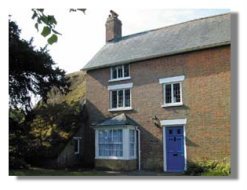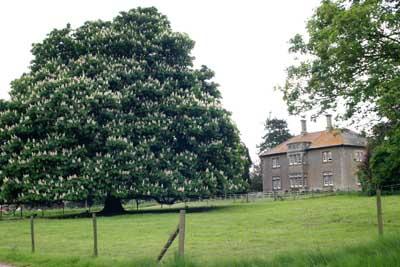
Just Before Winter
by Richard Jefferies [1886]
A rich tint of russet deepened on the forest top, and seemed to sink day by day deeper into the foliage like a stain; riper and riper it grew, as an apple colours. Broad acres these of the last crop, the crop of leaves; a thousand thousand quarters, the broad earth will be their barn. A warm red lies on the hill-side above the woods, as if the red dawn stayed there through the day; it is the heath and heather seeds; and higher still, a pale yellow fills the larches. The whole of the great hill glows with colour under the short hours of the October sun; and overhead, where the pine-cones hang, the sky is of the deepest azure. The conflagration of the woods burning luminously crowds into those short hours a brilliance the slow summer does not know.
A rich tint of russet deepened on the forest top, and seemed to sink day by day deeper into the foliage like a stain; riper and riper it grew, as an apple colours. Broad acres these of the last crop, the crop of leaves; a thousand thousand quarters, the broad earth will be their barn. A warm red lies on the hill-side above the woods, as if the red dawn stayed there through the day; it is the heath and heather seeds; and higher still, a pale yellow fills the larches. The whole of the great hill glows with colour under the short hours of the October sun; and overhead, where the pine-cones hang, the sky is of the deepest azure. The conflagration of the woods burning luminously crowds into those short hours a brilliance the slow summer does not know.
The frosts and mists and battering rains that follow in quick succession after the equinox, the chill winds that creep about the fields, have ceased a little while, and there is a pleasant sound in the fir trees. Everything is not gone yet. In the lanes that lead down to the 'shaws' in the dells, the 'gills,' as these wooded depths are called, buckler ferns, green, fresh, and elegantly fashioned, remain under the shelter of the hazel-lined banks. From the tops of the ash wands, where the linnets so lately sang, coming up from the stubble, the darkened leaves have been blown, and their much-divided branches stand bare like outstretched fingers. Black-spotted sycamore leaves are down, but the moss grows thick and deeply green; and the trumpets of the lichen seem to be larger, now they are moist, than when they were dry under the summer heat. Here is herb Robert in flower--its leaves are scarlet; a leaf of St. John's-wort, too, has become scarlet; the bramble leaves are many shades of crimson; one plant of tormentil has turned yellow. Furze bushes, grown taller since the spring, bear a second bloom, but not perhaps so golden as the first. It is the true furze, and not the lesser gorse; it is covered with half-opened buds; and it is clear, if the short hours of sun would but lengthen, the whole gorse hedge would become aglow again. Our trees, too, that roll up their buds so tightly, like a dragoon's cloak, would open them again at Christmas; and the sticky horse-chestnut would send forth its long ears of leaves for New Year's Day. They would all come out in leaf again if we had but a little more sun; they are quite ready for a second summer.
Brown lie the acorns, yellow where they were fixed in their cups; two of these cups seem almost as large as the great acorns from abroad. A red dead-nettle, a mauve thistle, white and pink bramble flowers, a white strawberry, a little yellow tormentil, a broad yellow dandelion, narrow hawkweeds, and blue scabious, are all in flower in the lane. Others are scattered on the mounds and in the meads adjoining, where may be collected some heath still in bloom, prunella, hypericum, white yarrow, some heads of red clover, some beautiful buttercups, three bits of blue veronica, wild chamomile, tall yellowwood, pink centaury, succory, dock cress, daisies, fleabane, knapweed, and delicate blue harebells. Two York roses flower on the hedge: altogether, twenty-six flowers, a large bouquet for October 19, gathered, too, in a hilly country.
Besides these, note the broad hedge-parsley leaves, tunnelled by leaf-miners; bright masses of haws gleaming in the sun; scarlet hips; great brown cones fallen from the spruce firs; black heart-shaped bindweed leaves here, and buff bryony leaves yonder; green and scarlet berries of white bryony hanging thickly on bines from which the leaves have withered; and bunches of grass, half yellow and half green, along the mound. Now that the leaves have been brushed from the beech saplings you may see how the leading stem rises in a curious wavy line; some of the leaves lie at the foot, washed in white dew, that stays in the shade all day; the wetness of the dew makes the brownish red of the leaf show clear and bright. One leaf falls in the stillness of the air slowly, as if let down by a cord of gossamer gently, and not as a stone falls--fate delayed to the last. A moth adheres to a bough, his wings half open, like a short brown cloak flung over his shoulders. Pointed leaves, some drooping, some horizontal, some fluttering slightly, still stay on the tall willow wands, like bannerets on the knights' lances, much torn in the late battle of the winds. There is a shower from a clear sky under the trees in the forest; brown acorns rattling as they fall, and rich coloured Spanish chestnuts thumping the sward, and sometimes striking you as you pass under; they lie on the ground in pocketfuls. Specks of brilliant scarlet dot the grass like some bright berries blown from the bushes; but on stooping to pick them, they are found to be the heads of a fungus. Near by lies a black magpie's feather, spotted with round dots of white.........
The short hours shorten, and the leaf-crop is gathered to the great barn of the earth; the oaks alone, more tenacious, retain their leaves, that have now become a colour like new leather. It is too brown for buff--it is more like fresh harness. The berries are red on the holly bushes and holly trees that grow, whole copses of them, on the forest slopes--'the Great Rough;' the half-wild sheep have polished the stems of these holly trees till they shine, by rubbing their fleeces against them. The farmers have been drying their damp wheat in the oast-houses over charcoal fires, and wages are lowered, and men discharged. Vast loads of brambles and thorns, dead firs, useless hop-poles and hop-bines, and gorse are drawn together for the great bonfire on the green. The 5th of November bonfires are still vital institutions, and from the top of the hill you may see them burning in all directions, as if an enemy had set fire to the hamlets.



